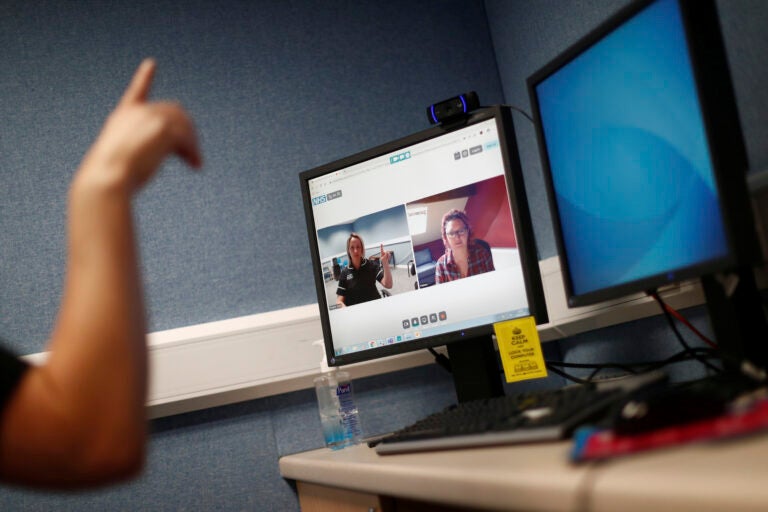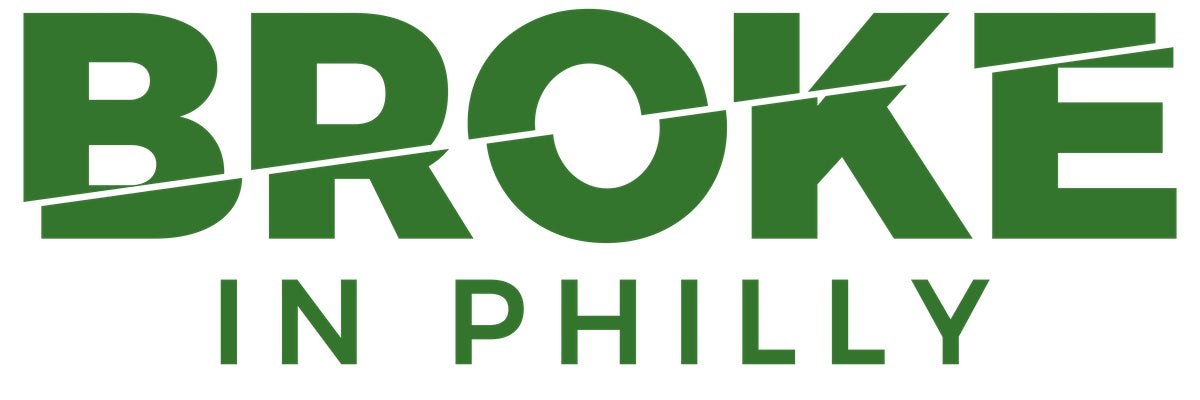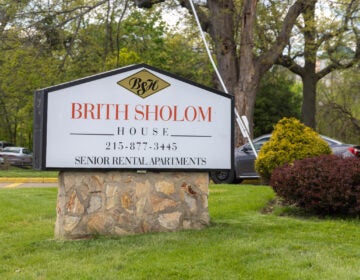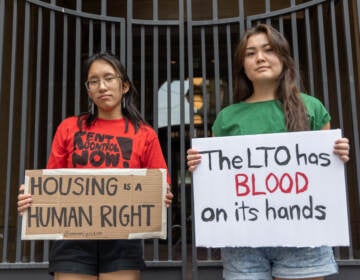Can evictions be avoided? Landlords and tenants are negotiating over Zoom
An initiative run by Good Shepherd Mediation Program aims to resolve conflicts between landlords and tenants at a time when many are struggling to pay rent due to COVID-19.

Professionals are turning to Zoom to carry out work typically done in person. (Hannah McKay/Pool Photo via AP)
Before the coronavirus pandemic began, Sue Wasserkrug, a program administrator at the Good Shepherd Mediation Program, mediated a conflict involving a tenant and a landlord. The tenant’s unit needed repairs, so the tenant had gone ahead and done the work himself, assuming that he could deduct the cost from his next rent payment. But the landlord hadn’t authorized the work ahead of time, so she was demanding full rent. The case came to Good Shepherd through the tenant. Over a roughly two-hour session, Wasserkrug helped the landlord and tenant come to an agreement. As often happens in such sessions, the level of tension gradually dissipated. At the end, the parties put an agreement in writing.
“It was a question of working out exactly how much the tenant was going to have deducted from future rental payments,” Wasserkrug said.
In many cases, the stakes are higher. In the last few years, well-publicized research has shown that tenants who are fighting evictions in landlord-tenant court face terrible odds. In a typical case, landlords are usually represented by lawyers, while tenants are usually not — an imbalance that works in the landlord’s favor.
Now that the pandemic has sparked a sharp economic downturn, advocates predict an “avalanche of evictions” that will hit after Gov. Tom Wolf’s moratorium on evictions ends in July. Mediation could prove a tool to help prevent those evictions.
Since the pandemic began, Wasserkrug’s group has offered virtual mediation through Zoom. Wasserkrug said she hasn’t yet personally done any video-conference mediations, but she has done some over the phone. It can be tricky to try to mediate conflicts without being able to read people’s body language, she says. But in any circumstance, the process can offer concrete benefits to both parties, she said.
“Mediation is a particularly good conflict-resolution process for situations where the parties have some kind of a relationship and they’re going to continue to have some kind of a relationship, as opposed to a car accident with a stranger, where you don’t know the person,” Wasserkrug said.
Mediators act as neutral third parties, and their goal is to help clients — including landlords and tenants — identify and talk through problems they’re having. And they help parties talk through grievances on both sides.
“It’s really all over the map,” Wassakrug said. “People might be having trouble paying their rent, or there might be problems with the unit and so they want to get out of the lease, or they just want to negotiate an exit plan, or [tenants] are having a problem with the neighbor and the landlord isn’t doing anything about it.”
Ideally, the mediation leads to some type of plan that both parties can agree to, Wasserkrug says, but often, it pays off even before that, just by helping the parties communicate better. (Wasserkrug also discussed the mediation program on a recent Next City webinar.)
“It’s free. It’s way less stressful and more convenient [than court]. It causes a lot less disruption in people’s lives. It can eliminate the need for landlords’ units to go empty and for the possibility that tenants might become homeless,” she said.
As more tenants struggle with rent, landlords turn to mediators
Philadelphia’s eviction mediation program began last fall, when the city funded a two-month pilot carried out by the Good Shepherd Mediation Program, a 35-year-old nonprofit focused on neighborhood conflict resolution. The program, part of the Philadelphia Eviction Prevention Project and partially funded with a $10,000 AARP Community Challenge grant, was free and voluntary and relied mostly on referrals from legal-aid groups.
After the pilot ended, as the program continued with funding from a mix of donations and grants, city officials began talking about expanding it into a 12-month pilot using money from the city’s Housing Trust Fund, said Carolyn Brown, director of planning and evaluation for The Office of Community Empowerment & Opportunity.
The Office also began to develop metrics to measure the success of the program, Brown said, including the number of mediator volunteers trained; the number of participants along with their age, race, income and census tract; the total number of disputes mediated (a “handful” during the two-month, city-funded pilot); and so on.
Mediation could become more attractive to landlords during the coronavirus pandemic as more tenants struggle to pay rent, Brown said. According to Wasserkrug, almost all of Good Shepherd’s cases used to come from tenant inquiries. But since the city began doing more targeted outreach during the pilot, the group has gotten many more inquiries from landlords.
The pandemic struck before the city’s Fiscal Year 2021 could be finalized. And now, as city officials are struggling with huge budget shortfalls, the mayor’s budget proposal includes major cuts to some eviction-prevention services that advocates say are critical. Good Shepherd was hoping to scale up its mediation services for landlords and tenants under a 12-month pilot with the city, but is waiting on the budget outcome to learn whether it can do so.

Subscribe to PlanPhilly
In addition to the pre-filing mediation services offered by Good Shepherd, the city’s Fair Housing Commission (FHC) is starting to offer mediation for landlords and tenants prior to Commission hearings. Most cases at the FHC are initiated by tenants who are having problems with landlords who won’t make repairs or fix other issues. Rue Landau, who is executive director of the Philadelphia Commission on Human Relations and the Fair Housing Commission, says that landlord and tenant relationships break down for all sorts of reasons, and “resolving before they get to court is essential.”
“There is a big power dynamic in landlord-tenant relationships,” Landau said. “Many tenants will do anything to keep a roof over their heads, which includes not complaining about significant repairs to a property, which is something that we really need to change in Philadelphia.”
In recent years, as rents have risen in Philadelphia, more people have begun trying to make a living as landlords, Landau says. And with aging housing stock, the city has a “habitability problem” which some new landlords haven’t been prepared to address with timely repairs. Those repairs are critical, and part of a contract that landlords need to abide by, Landau says. And even though landlords have more power than tenants in most cases, mediation can help both parties understand and exercise their rights, without damaging legal and financial consequences.
“Mediation by a neutral third party, especially pre-court mediation, helps to balance that power dynamic,” said Landau. “When done right, you’re making sure that the tenant is not giving up any of their legal rights, and that landlords are protected as well.”
 This article is part of Broke in Philly, a collaborative reporting project among 23 news organizations, focused on Philadelphia’s push towards economic justice. Read more of our reporting at brokeinphilly.org.
This article is part of Broke in Philly, a collaborative reporting project among 23 news organizations, focused on Philadelphia’s push towards economic justice. Read more of our reporting at brokeinphilly.org.
WHYY is your source for fact-based, in-depth journalism and information. As a nonprofit organization, we rely on financial support from readers like you. Please give today.




![CoronavirusPandemic_1024x512[1]](https://whyy.org/wp-content/uploads/2020/03/CoronavirusPandemic_1024x5121-300x150.jpg)

